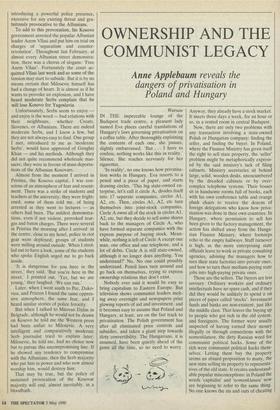OWNERSHIP AND THE COMMUNIST LEGACY
Anne Applebaum reveals the
dangers of privatisation in Poland and Hungary
Warsaw IN THE impeccable lounge of the Budapest trade centre, a pleasant lady named Eva places careful translations of Hungary's laws governing privatisation on a coffee table. After thoroughly explaining the contents of each one, she pauses, slightly embarrassed. 'But . . I have to confess, nothing works like this in reality.' Silence. She reaches nervously for her cigarettes.
'In reality', no one knows how privatisa- tion works in Hungary. Eva resorts to a pencil and a piece of paper, and starts drawing circles. 'This big state-owned en- terprise, let's call it circle A, divides itself into 17 separate companies, circles Al, A2, etc. Then, circles A1, A2, etc turn themselves into joint-stock companies. Circle A owns all of the stock in circles Al, A2, etc, but they decide to sell some shares back to the managers of Circle A, who have formed separate companies with the express purpose of buying stock. Mean- while, nothing is left of Circle A except one man, one office and one telephone, and a lot of debts. Circle A is still state-owned, although it no longer does anything. You understand?' No. No one could possibly understand. Pencil lines turn around and go back on themselves, trying to express ownership relations that don't exist.
Nobody ever said it would be easy to bring capitalism to Eastern Europe. But television shows communist leaders melt- ing away overnight and newspapers print glowing reports of aid and investment, and it becomes easy to assume that Poland and Hungary, at least, are on the fast track to privatisation. The Polish government has after all eliminated price controls and subsidies, and taken a giant step towards zloty convertibility. The Hungarians, it is assumed, have been quietly ahead of the game all the time, so no need to worry. Anyway, they already have a stock market. It meets three days a week, for an hour or so, in a rented room in central Budapest.
Now, there are only two problems with any transaction involving a state-owned Polish or Hungarian company: finding the seller, and finding the buyer. In Poland, where the Finance Ministry has given itself the right to sell state property, the 'seller' problem might be metaphorically express- ed by the said ministry's lack of filing cabinets. Ministry secretaries sit behind large, solid, wooden desks, unencumbered by the dreaded cabinets or by over- complex telephone systems. Their bosses sit in handsome rooms full of books, each with his own conference table and orange plush chairs to receive the dozens of foreign delegations who know how priva- tisation was done in their own countries. In Hungary, where permission to sell has been given to the factory management, the action has shifted away from the Hunga- rian Finance Ministry, where footsteps echo in the empty hallways. Staff turnover is high, as the more enterprising state officials leave to work in private consulting agencies, advising the managers how to turn their state factories into private ones, and how to turn their medium-paying state jobs into high-paying private ones.
Those are the sellers. The buyers are less savoury. Ordinary workers and ordinary intellectuals have no spare cash, and if they did they would be unlikely to spend it on pieces of paper called 'stocks'. Investment funds and banks are non-existent, just like the middle class. That leaves the buying up to people who got rich in the old system, and foreigners. The former were usually suspected of having earned their money illegally or through connections with the nomenklatura, the dirty Russian word for communist political hacks. Some of the rich were communist political hacks them- selves. Letting them buy the property seems an absurd proposition to many, the new state selling its property to representa- tives of the old state. It creates understand- able popular misconceptions: in Poland the words 'capitalist' and `nomenklatura' now are beginning to refer to the same thing. No one knows the ins and outs of cheating the government better than the manager of a socialist state company.
At the same time, foreigners receive varying degrees of welcome in different countries, and the smallest welcome of all in Poland. Hitler wanted occupied Poland to become a kind of German colony, whose best products would be piled on trains and sent West. The thought of German industrialists buying cheap Polish factories and paying low wages to their Polish workers in order then to pile the country's best products on trains and send them West remains distinctly unappealing.
Hungarians also worry about ex- communists and foreigners running off with their national wealth, but they are more practical than the romantic Poles, who think they can avoid these problems by writing the privatisation rules correctly. One Hungarian journalist, sighing over the lack of investment capital, thought the best thing to do was give up and not worry, since 'the question is not whether or not there should be corruption, but who would profit from this corruption'. If the state earns money when a former communist pays it something, let him do it. Give him the property, the journalist argued, and within six months he'll either be bankrupt or he'll be a capitalist. But privatisation in Poland and Hungary will not only be a matter of finding sellers and buyers, it will also entail a slow process of learning that, however it was done in the West, it won't work that way here. Proper- ty valuation? 'Fair' share prices? Tax breaks for workers buying shares in their own companies, in countries without prop- er tax systems?
On the ground, the picture is clear. The manager of a Warsaw confectionery allegedly 'on the list' for early privatisation — says he has wanted his company to go private for a long time. He is looking forward to share-buying privileges which he hopes will be granted to workers in the factory including himself. In the next build- ing, the workers themselves, leaning over their cauldrons of boiling chocolate, have heard nothing about it and laugh when asked if they would spend any of their 500,000 zloty (£35) monthly wage on pieces of paper which the bank tells them equal a `share'. Equation number one: workers' privileges equal directors' privileges. In another building the company's chief accountant stutters when explaining how the audit is going, and sends inquiring visitors down a long narrow hallway to a bespectacled under-accountant in a tiny room. When asked what the factory's main building is worth, she pulls out an enor- mous ledger, and says it was worth 1,499,722 zlotys in 1945. Then she multi- plies that number by another number say, 173 — which government forms have established as the rate of inflation, and gets the value for 1990. Could she guess what the 'market value' of the building might be, or how to calculate depreciation? She is surprised by the question: No, I wouldn't know how to do anything without the rules,' and waves at the stack of official forms her office has saved since 1945. Equation number two: factory values equal an imaginary number in a socialist eco- nomy, since market value cannot be gauged without markets.
The under-accountant also has an easy explanation of the factory's current 'pro- fitability'. 'There was no limit to demand, and wages were low.' The factory is part of a monopoly system, and competes neither for sales nor for labour. Equation number three: profitability in a socialist economy does not equal profitability in a capitalist economy, unless privatisation is conducted so as to leave monopolies in place, which translates exploitation by state into ex- ploitation by corporation.
If Polish and Hungarian privatisation turn out badly, the backlash, whether anti-foreign, anti-capitalist, or anti- democratic, could be vicious. This would be communism's posthumous victory: a legacy of resentment, incompetence and economic illiteracy, strong enough to pre- vent capitalism from taking its place.



















































 Previous page
Previous page